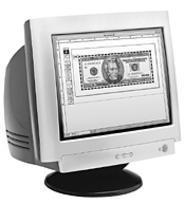Call it the case of the bad handoff.
As Justin Ferguson and DeLonte Hudson waited to board their flight to Nashville in January, security guards pulled them aside for a baggage search. Ferguson, 25, played it cool as a guard inspected the laptop and printer he carried. Hudson played it like what he is -- a teenager.
Told to set his belongings on a table, court records show, Hudson yanked a large envelope from the back of his pants. Then, in a move even Johnny Knoxville might advise against, he tried to hand it to Ferguson. Before they could finish the swap, a guard stepped between them and grabbed the package. Hudson denied it was his, claiming he'd found it at a Burger King inside Hopkins International.
If that were true, he scored one helluva Big Kids Meal.
The envelope held several sheets of fake $100 bills and money orders valued at $250 apiece. The $11,400 in phony funds would buy Ferguson and Hudson a very real pair of handcuffs and lead authorities to what they allege is one of the largest -- and likely the youngest -- counterfeiting rings to hit the city in years.
Ferguson and five other Cleveland men face federal charges that they used personal computers and printers to whip up more than $200,000 in homemade bills and money orders. (A seventh suspect died in a car wreck in May, two days after the group was indicted.) The men, ages 19 to 30, allegedly passed the bogus Benjamins and other dead presidents in six states, over two years.
But it also appears that a band of trusted legmen -- or legboys, as it were -- lent a hand with distribution. According to authorities, a number of juveniles plunked down fake $50 and $100 bills on small purchases at grocery stores, furniture outlets, and lumberyards to receive genuine currency in return. They then would revisit the stores to exchange the items for more cash.
Whether the teens involved in the purported scheme were arrested remains unclear -- none are named in court files, and prosecutors aren't talking. Nor do the documents explain whether Hudson, the sole juvenile identified, played any role beyond unwittingly tipping off the feds, or wound up being charged.
Still, the case suggests that Cleveland has tapped into one of the country's hottest boom industries for young entrepreneurs eager to work less and earn more -- digital counterfeiting.
"It's literally exploding," says Len Drinkard, a tech-crime investigator for the U.S. Department of Labor in Cleveland. "It's absolutely out of control. It's so out of control, they don't want to admit it."
"They" would be the Secret Service, created in 1865 by Abraham Lincoln to lasso counterfeiters. For more than a century afterward, the agency could more or less coast. An offset printer the size of a car and a set of engraving plates were the only reliable means of producing imitation bills -- and neither was available at Best Buy.
Then along came the PC, the tool that puts fake money at the fingertips of hardcore criminal and pimply-faced youth alike.
Consider: Last August, Cleveland Heights police busted four twentysomethings who used computers to make $50,000, circulating some of it through drug dealers. The arrests occurred weeks after two teens in Kinsman were collared for passing $20 bills in their school's cafeteria, money they'd printed off one boy's iMac.
Two vastly different scams, one shared approach to screwing The Man. As Daniel Dluzneski of the Secret Service's D.C. office puts it, counterfeiting "now takes relatively little intelligence or skill."
Or none, given the how-to tips that litter the Internet. "In a few minutes, you can have hundreds, even thousands of dollars," adds Art Bowker, a federal probation officer in Cleveland who monitors computer criminals.
In 1995, less than 1 percent of the ersatz cash passed nationwide rolled off inkjet printers. By last year, the figure had soared to almost $18 million, or 40 percent of the total. During the same span, the number of people arrested for clicking-and-counterfeiting rocketed from 37 to 3,734, with more than 700 juveniles cuffed in 2002.
The Secret Service insists that bogus bills account for less than 1 percent of the currency in circulation. Yet some investigators ascribe that figure less to fact than counterfeit math. "We don't know what we haven't seen," says Akron Detective Stanley Smith, who probes tech crimes. "A lot of money gets by -- more than we can know."
The $264,000 in fake greenbacks passed last year in Cleveland represents about as much as New York, Los Angeles, or Miami sees in just two weeks. Even so, Drinkard predicts that Ohio, with its depressed economy and shrinking job base, will become a growth market for counterfeiters in coming years. "These things always start on the coasts. The trend will hit here eventually."
In fact, it may have already landed, judging from the alleged ring exposed when Hudson and Ferguson tried to play pass-the-envelope at the airport.
In court files, prosecutors portray Shaker Heights resident Jamie Johnson as a virtual one-man mint, accusing him of cranking out almost $150,000 on his home computer. Meanwhile, Ferguson and two others, Joron Crawford and Jason Dotson, allegedly produced $61,500 in Western Union money orders. They and the others spent the insta-funds in stores as far away as New York and Orlando, according to authorities.
Among those charged, only Crawford, who's on house arrest after posting bond, responded to Scene's interview requests. He's pleaded not guilty and disputes belonging to a broader plot. "There was no conspiracy or no big gang."
Maybe. But either way, the 19-year-old Crawford seems to soften when asked how he feels about facing decades behind bars if convicted. Perhaps he's aware that federal court is among the worst places to show false bravado.
"The only thing I can do is take responsibility for what I did and put it in God's hands."














